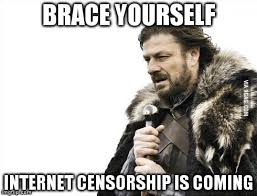Another Court Rejects Trump’s Censorial Anti-TikTok EO–Marland v. Trump
[IF YOU HAVEN’T VOTED, PLEASE DO SO. MAKE YOUR VOICE HEARD!]
 This summer, President Trump issued a series of brazenly censorial executive orders trying to kick TikTok and WeChat out of the United States. The EOs claim to be curbing threats to national security posed by TikTok and WeChat. However, like virtually everything else the Trump administration says, those explanations are flat-out lies. Instead, the EOs were pure censorship–with zero nuance, the EOs tried to shut down speech venues. This put the US Department of Justice attorneys into a mockable position of defending the indefensible.
This summer, President Trump issued a series of brazenly censorial executive orders trying to kick TikTok and WeChat out of the United States. The EOs claim to be curbing threats to national security posed by TikTok and WeChat. However, like virtually everything else the Trump administration says, those explanations are flat-out lies. Instead, the EOs were pure censorship–with zero nuance, the EOs tried to shut down speech venues. This put the US Department of Justice attorneys into a mockable position of defending the indefensible.
Not surprisingly, the courts have been shredding the EOs and hammering the DOJ’s arguments. In response to a lawsuit by WeChat’s users, a court struck down the anti-WeChat EO on First Amendment grounds. (An update on that lawsuit below). In response to TikTok’s lawsuit, a court struck down the anti-TikTok EOs on statutory grounds. Now, another judge has trashed the EOs on behalf of TikTok’s users. In a technical opinion, the court says that the EOs were “ultra vires,” meaning the Trump administration exceeded its statutory authority.
The DOJ argued that courts categorically can’t review any presidential emergency actions based on national security concerns. The court’s like LOLNO.
The Trump administration issued the EOs pursuant to a statute named IEEPA, which contains an exception on the government’s authority to restrict “informational materials.” The court says the “short videos created and exchanged on TikTok are expressive and informative, and are analogous to the ‘films,’ ‘artworks,’ ‘photographs,’ and ‘news wire feeds’ expressly protected” as informational materials.
Though the EOs’ restrictions (as amplified by the Commerce Department) only targeted TikTok’s contracts with third-party vendors, those restrictions will functionally deprecate TikTok. (Remember, the goal is to kick TikTok out of the US). The court hammers the DOJ for claiming the speech restrictions are incidental:
the Identification will have the effect of stopping over 100 million existing U.S. users from continuing to use the TikTok app as of November 12. This in turn will have the effect of preventing these users from exchanging informational materials created and posted on the app with each other and with over 600 million international TikTok users…The Commerce Identification presents a threat to the ‘robust exchange of informational materials’.
(The court also calls one DOJ argument “clearly incorrect” because “Congress itself rejected [that] interpretation over 30 years ago”).
The court adds that shutting down TikTok poses irreparable harm to TikTok influencers because they will “lose the ability to engage with their millions of followers on TikTok, and the related brand sponsorships.” #SaveTheInfluencers.
The EOs undoubtedly violate the constitution as well, but this court didn’t reach that issue. Even so, this opinion is yet another example of how the Trump administration–which ironically highlights “Law and Order” in its campaign–is repeatedly getting slammed for blatantly disregarding the law. If we actually care about the rule of law, WE NEED TO EVICT THE LAWLESS CLOWNS CURRENTLY IN OFFICE AND ALL OF THEIR ENABLERS.
Case citation: Marland v. Trump, 2:20-cv-04597-WB (E.D. Pa. Oct. 30, 2020)
BONUS: In the WeChat users’ litigation, the DOJ sought to stay the court’s injunction during its appeal. In support of that, it provided extra evidence to the judge about its national security concerns. The court says that the new evidence doesn’t change the fact that the EOs were not narrowly tailored to the purported national security threats. Thus, the court denies the motion to stay the injunction. U.S. WeChat Users Alliance v. Trump, 2020 WL 6271054 (N.D. Cal. Oct. 23, 2020).
BONUS 2: Anupam Chander and I discussed the TikTok affair a month ago at a program organized by the Northeastern Law School. Check out the video.

Pingback: News of the Week; November 4, 2020 – Communications Law at Allard Hall()